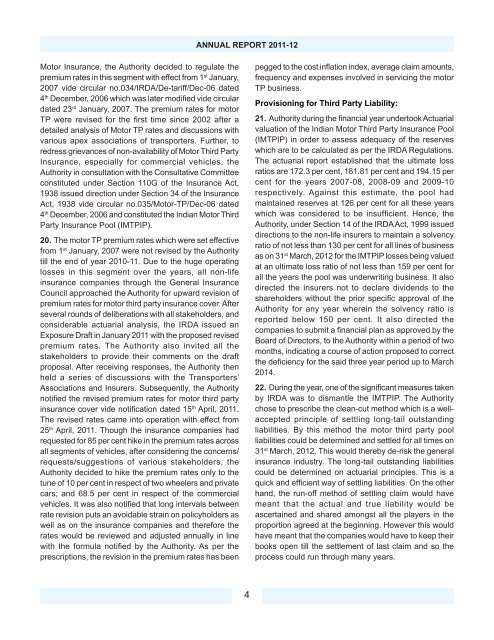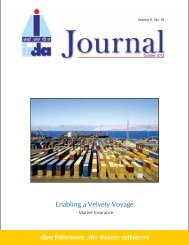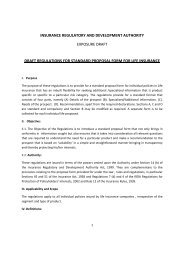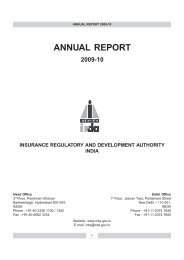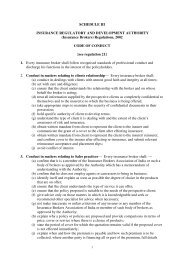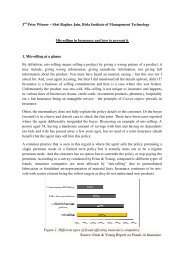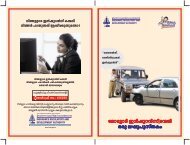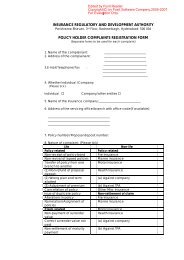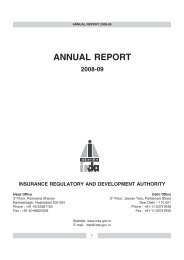Download PDF - IRDA
Download PDF - IRDA
Download PDF - IRDA
You also want an ePaper? Increase the reach of your titles
YUMPU automatically turns print PDFs into web optimized ePapers that Google loves.
ANNUAL REPORT 2011-12<br />
Motor Insurance, the Authority decided to regulate the<br />
premium rates in this segment with effect from 1 st January,<br />
2007 vide circular no.034/<strong>IRDA</strong>/De-tariff/Dec-06 dated<br />
4 th December, 2006 which was later modified vide circular<br />
dated 23 rd January, 2007. The premium rates for motor<br />
TP were revised for the fi rst time since 2002 after a<br />
detailed analysis of Motor TP rates and discussions with<br />
various apex associations of transporters. Further, to<br />
redress grievances of non-availability of Motor Third Party<br />
Insurance, especially for commercial vehicles, the<br />
Authority in consultation with the Consultative Committee<br />
constituted under Section 110G of the Insurance Act,<br />
1938 issued direction under Section 34 of the Insurance<br />
Act, 1938 vide circular no.035/Motor-TP/Dec-06 dated<br />
4 th December, 2006 and constituted the Indian Motor Third<br />
Party Insurance Pool (IMTPIP).<br />
20. The motor TP premium rates which were set effective<br />
from 1 st January, 2007 were not revised by the Authority<br />
till the end of year 2010-11. Due to the huge operating<br />
losses in this segment over the years, all non-life<br />
insurance companies through the General Insurance<br />
Council approached the Authority for upward revision of<br />
premium rates for motor third party insurance cover. After<br />
several rounds of deliberations with all stakeholders, and<br />
considerable actuarial analysis, the <strong>IRDA</strong> issued an<br />
Exposure Draft in January 2011 with the proposed revised<br />
premium rates. The Authority also invited all the<br />
stakeholders to provide their comments on the draft<br />
proposal. After receiving responses, the Authority then<br />
held a series of discussions with the Transporters’<br />
Associations and Insurers. Subsequently, the Authority<br />
notifi ed the revised premium rates for motor third party<br />
insurance cover vide notifi cation dated 15 th April, 2011.<br />
The revised rates came into operation with effect from<br />
25 th April, 2011. Though the insurance companies had<br />
requested for 85 per cent hike in the premium rates across<br />
all segments of vehicles, after considering the concerns/<br />
requests/suggestions of various stakeholders, the<br />
Authority decided to hike the premium rates only to the<br />
tune of 10 per cent in respect of two wheelers and private<br />
cars; and 68.5 per cent in respect of the commercial<br />
vehicles. It was also notifi ed that long intervals between<br />
rate revision puts an avoidable strain on policyholders as<br />
well as on the insurance companies and therefore the<br />
rates would be reviewed and adjusted annually in line<br />
with the formula notifi ed by the Authority. As per the<br />
prescriptions, the revision in the premium rates has been<br />
pegged to the cost inflation index, average claim amounts,<br />
frequency and expenses involved in servicing the motor<br />
TP business.<br />
Provisioning for Third Party Liability:<br />
21. Authority during the financial year undertook Actuarial<br />
valuation of the Indian Motor Third Party Insurance Pool<br />
(IMTPIP) in order to assess adequacy of the reserves<br />
which are to be calculated as per the <strong>IRDA</strong> Regulations.<br />
The actuarial report established that the ultimate loss<br />
ratios are 172.3 per cent, 181.81 per cent and 194.15 per<br />
cent for the years 2007-08, 2008-09 and 2009-10<br />
respectively. Against this estimate, the pool had<br />
maintained reserves at 126 per cent for all these years<br />
which was considered to be insuffi cient. Hence, the<br />
Authority, under Section 14 of the <strong>IRDA</strong> Act, 1999 issued<br />
directions to the non-life insurers to maintain a solvency<br />
ratio of not less than 130 per cent for all lines of business<br />
as on 31 st March, 2012 for the IMTPIP losses being valued<br />
at an ultimate loss ratio of not less than 159 per cent for<br />
all the years the pool was underwriting business. It also<br />
directed the insurers not to declare dividends to the<br />
shareholders without the prior specifi c approval of the<br />
Authority for any year wherein the solvency ratio is<br />
reported below 150 per cent. It also directed the<br />
companies to submit a fi nancial plan as approved by the<br />
Board of Directors, to the Authority within a period of two<br />
months, indicating a course of action proposed to correct<br />
the defi ciency for the said three year period up to March<br />
2014.<br />
22. During the year, one of the significant measures taken<br />
by <strong>IRDA</strong> was to dismantle the IMTPIP. The Authority<br />
chose to prescribe the clean-cut method which is a wellaccepted<br />
principle of settling long-tail outstanding<br />
liabilities. By this method the motor third party pool<br />
liabilities could be determined and settled for all times on<br />
31 st March, 2012. This would thereby de-risk the general<br />
insurance industry. The long-tail outstanding liabilities<br />
could be determined on actuarial principles. This is a<br />
quick and effi cient way of settling liabilities. On the other<br />
hand, the run-off method of settling claim would have<br />
meant that the actual and true liability would be<br />
ascertained and shared amongst all the players in the<br />
proportion agreed at the beginning. However this would<br />
have meant that the companies would have to keep their<br />
books open till the settlement of last claim and so the<br />
process could run through many years.<br />
4


